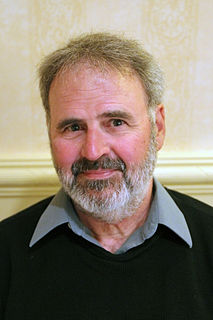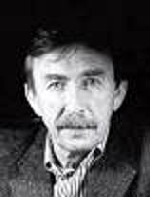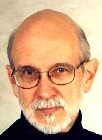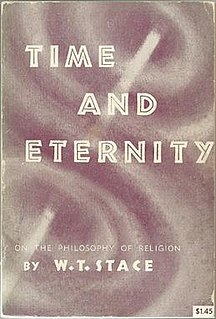Related Research Articles
Skepticism or scepticism is generally a questioning attitude or doubt towards one or more items of putative knowledge or belief or dogma. It is often directed at domains, such as the supernatural, morality, theism, or knowledge. Formally, skepticism as a topic occurs in the context of philosophy, particularly epistemology, although it can be applied to any topic such as politics, religion, and pseudoscience.

Alvin Carl Plantinga is an American analytic philosopher who works primarily in the fields of philosophy of religion, epistemology, and logic.
The skeptical movement is a modern social movement based on the idea of scientific skepticism. Scientific skepticism involves the application of skeptical philosophy, critical-thinking skills, and knowledge of science and its methods to empirical claims, while remaining agnostic or neutral to non-empirical claims. The movement has the goal of investigating claims made on fringe topics and determining whether they are supported by empirical research and are reproducible, as part of a methodological norm pursuing "the extension of certified knowledge". The process followed is sometimes referred to as skeptical inquiry.
Naturalistic pantheism, also known as scientific pantheism, is a form of pantheism. It has been used in various ways such as to relate God or divinity with concrete things, determinism, or the substance of the Universe. God, from these perspectives, is seen as the aggregate of all unified natural phenomena. The phrase has often been associated with the philosophy of Baruch Spinoza, although academics differ on how it is used.
Nontheism or non-theism is a range of both religious and nonreligious attitudes characterized by the absence of espoused belief in a God or gods. Nontheism has generally been used to describe apathy or silence towards the subject of God and differs from an antithetical, explicit atheism. Nontheism does not necessarily describe atheism or disbelief in God; it has been used as an umbrella term for summarizing various distinct and even mutually exclusive positions, such as agnosticism, ignosticism, ietsism, skepticism, pantheism, atheism, strong or positive atheism, implicit atheism, and apatheism. It is in use in the fields of Christian apologetics and general liberal theology.

Robert Todd Carroll was an American writer and academic. Carroll was best known for his contributions in the field of skepticism; he achieved notability by publishing The Skeptic's Dictionary online in 1994. He was elected a fellow of the Committee for Skeptical Inquiry in 2010. He described himself as a naturalist, an atheist, a materialist, a metaphysical libertarian, and a positivist.

Religious naturalism combines a naturalist worldview with ideals, perceptions, traditions, and values that have been traditionally associated with many religions or religious institutions. "Religious naturalism is a perspective that finds religious meaning in the natural world and rejects the notion of a supernatural realm." The term "religious" in this context is construed in general terms, separate from the traditions, customs, or beliefs of any one of the established religions.

Michael Dowd is an American Progressive Christian minister, author, and eco-theologian known as an advocate of Big History, religious naturalism, sustainability, climate activism, and the epic of evolution.
Metaphysical naturalism is a philosophical worldview which holds that there is nothing but natural elements, principles, and relations of the kind studied by the natural sciences. Methodological naturalism is a philosophical basis for science, for which metaphysical naturalism provides only one possible ontological foundation. Broadly, the corresponding theological perspective is religious naturalism or spiritual naturalism. More specifically, metaphysical naturalism rejects the supernatural concepts and explanations that are part of many religions.
The evolutionary argument against naturalism (EAAN) is a philosophical argument asserting a problem with believing both evolution and philosophical naturalism simultaneously. The argument was first proposed by Alvin Plantinga in 1993 and "raises issues of interest to epistemologists, philosophers of mind, evolutionary biologists, and philosophers of religion". The EAAN argues that the combined belief in both evolutionary theory and naturalism is epistemically self-defeating. The argument for this is that if both evolution and naturalism are true, then the probability of having reliable cognitive faculties is low.

Loyal D. Rue is an American philosopher of religion. He is professor emeritus of religion and philosophy at Luther College of Decorah, Iowa. He focuses on naturalistic theories of religion and has been awarded two John Templeton Foundation fellowships. He has been for many years a member and lecturer at the Institute on Religion in an Age of Science (IRAS).
James William Chichetto is a poet, artist, Professor of Communications, and a Catholic priest of the Congregation of Holy Cross, an international religious community that founded and sponsors the University of Notre Dame, Stonehill College, the University of Portland, and King's College, among others.

Jerome A. Stone is an American author, philosopher, and theologian. He is best known for helping to develop the religious movement of Religious Naturalism. Stone is on the Adjunct Faculty of Meadville Lombard Theological School; is Emeritus Professor of Philosophy at William Rainey Harper College; is in Preliminary Fellowship with the Unitarian Universalist Association; and is a member of the Highlands Institute of American Religious and Philosophical Thought (HIARPT) and the Institute on Religion in an Age of Science (IRAS).

Spiritual naturalism, or naturalistic spirituality combines a naturalist approach to spiritual ways of looking at the world. Spiritual naturalism may have first been proposed by Joris-Karl Huysmans in 1895 in his book En Route.
Coming into prominence as a writer during the 1870s, Huysmans quickly established himself among a rising group of writers, the so-called Naturalist school, of whom Émile Zola was the acknowledged head...With Là-bas (1891), a novel which reflected the aesthetics of the spiritualist revival and the contemporary interest in the occult, Huysmans formulated for the first time an aesthetic theory which sought to synthesize the mundane and the transcendent: "spiritual Naturalism".

Donald Allen Crosby is Professor Emeritus of Philosophy at Colorado State University, since January 2000. Crosby's interests focus on metaphysics, American pragmatism, philosophy of nature, existentialism, and philosophy of religion. He is a member of the Highlands Institute of American Religious and Philosophical Thought (HAIRPT) and has been a leader in the discussions on Religious Naturalism.
Michael C. Rea is an analytic philosopher and, since 2017, John A. O'Brien Professor of Philosophy at the University of Notre Dame. He specializes in metaphysics and philosophy of religion and has competence in epistemology and applied ethics as well. He is currently writing a book on divine hiddenness, in which he appeals to quantifier pluralism and argues that God cannot be quantified over by humans. He gave a talk on divine hiddenness in the 2017 Gifford Lectures.

Frankie Starlight is a 1995 drama–romantic war film directed by Michael Lindsay-Hogg. The screenplay was written by Ronan O'Leary and Chet Raymo, based on the internationally best-selling novel The Dork of Cork by Raymo.
In philosophy, naturalism is the idea or belief that only natural laws and forces operate in the universe. Adherents of naturalism assert that natural laws are the rules that govern the structure and behavior of the natural universe, that the changing universe at every stage is a product of these laws.
Naturalism is not so much a special system as a point of view or tendency common to a number of philosophical and religious systems; not so much a well-defined set of positive and negative doctrines as an attitude or spirit pervading and influencing many doctrines. As the name implies, this tendency consists essentially in looking upon nature as the one original and fundamental source of all that exists, and in attempting to explain everything in terms of nature. Either the limits of nature are also the limits of existing reality, or at least the first cause, if its existence is found necessary, has nothing to do with the working of natural agencies. All events, therefore, find their adequate explanation within nature itself. But, as the terms nature and natural are themselves used in more than one sense, the term naturalism is also far from having one fixed meaning.
Gary Michael Gutting was an American philosopher and holder of an endowed chair in philosophy at the University of Notre Dame. His daughter is writer Tasha Alexander.

Time and Eternity - An Essay on the Philosophy of Religion is a philosophy book written by Walter Terence Stace. At the time of writing, Stace was a professor of philosophy at Princeton University, where he had worked since 1932 after a 22-year career in the Ceylon Civil Service. Time and Eternity was one of his first books about the philosophy of religion and mysticism, after writing throughout most of the 1930s and 1940s that was influenced by phenomenalist philosophy.
References
- ↑ "Stonehill College". stonehill.edu. Archived from the original on July 20, 2011. Retrieved March 21, 2011.
- ↑ "to The Notre Dame Magazine". magazine.nd.edu. Retrieved March 18, 2011.
- ↑ "Scientific American". scientificamerican.com. Retrieved February 3, 2010.
- ↑ Chet Raymo’s blog January 22, 2013